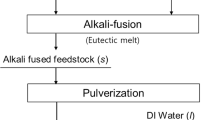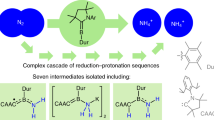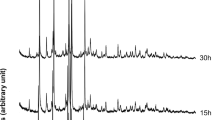Abstract
PREVIOUS work on the decomposition of alpha-lead azide have been performed at temperatures close to its ignition temperature1,2. The assumption has been made that the products of such decompositions have been only lead metal and nitrogen gas. The present communication describes the results of a study on the solid material obtained from the low-temperature thermal decomposition of alpha-lead azide.
This is a preview of subscription content, access via your institution
Access options
Subscribe to this journal
Receive 51 print issues and online access
$199.00 per year
only $3.90 per issue
Buy this article
- Purchase on Springer Link
- Instant access to full article PDF
Prices may be subject to local taxes which are calculated during checkout
Similar content being viewed by others
References
Griffiths, P. J. F., and Groocock, J. M., J. Chem. Soc., 3380 (1957).
Garner, W. E., and Gomm, A. S., J. Chem. Soc., 2123 (1931).
Garner, W. E., Proc. Roy. Soc., A, 246, 203 (1958).
Author information
Authors and Affiliations
Rights and permissions
About this article
Cite this article
STAMMLER, M., ABEL, J. & KAUFMAN, J. Products of Decomposition of Lead Azide. Nature 185, 456–458 (1960). https://doi.org/10.1038/185456b0
Issue Date:
DOI: https://doi.org/10.1038/185456b0
This article is cited by
-
Kinetics of Reaction of the Decomposition of Lead Azide
Nature (1961)
Comments
By submitting a comment you agree to abide by our Terms and Community Guidelines. If you find something abusive or that does not comply with our terms or guidelines please flag it as inappropriate.



